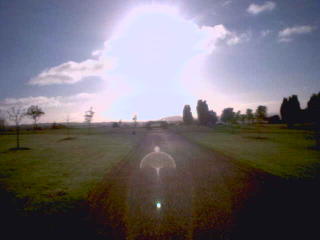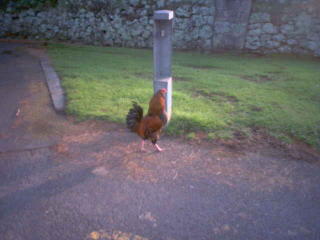Thursday 29th, Fri 30th Sept - Scene Design
 This lesson began in the waiting room of Glenfield Dental Surgery as Marie got scaled and polished. It finished in Cornwall Park (pictured), Greenlane, in the brilliant sunshine of Friday morning!
This lesson began in the waiting room of Glenfield Dental Surgery as Marie got scaled and polished. It finished in Cornwall Park (pictured), Greenlane, in the brilliant sunshine of Friday morning!I was looking at scene design, chapter 10 of Story. Scenes are what makes up Acts, as I discovered last Friday.
"A scene is a story in miniature ... No matter locations or length, a scene is unified around desire, action, conflict and change."
 Scene design, this chapter told me, was about
Scene design, this chapter told me, was about- turning points
- setups/payoffs
- emotional dynamics
- choice
The best example of a very major turning point is the climax of The Sixth Sense, where (SPOILER ALERT!!) Bruce Willis realises he's, well, dead. And not just a little bit, either.
Interestingly, the film actually shows some of those clues, because in initial screenings they found the audience didn't really get what was going on. So they cut in the boy saying "They don't even know they're dead". (Thanks to the film Edge Codes for that insight!)
That was a brilliant "aha!" moment. One of my favourites of all time. So was Darth Vader saying "Luke, I am your father!" So was Humphrey Bogart's character realising that Ilsa thought her husband had died, then discovered he was alive.
"The effect of a beautifully turned moment," says McKee, "is that the filmgoers experience a rush of knowledge as if they did it for themselves."
He then said something very interesting about the writing craft: it's not through your language that self-expression really comes, that's just surface. It's through these moments, these turning points that true self-expression as a writer comes.
Fascinating!
Setups and payoffs... at a Janet Roach workshop I attended earlier this year, she said "Never set up what you don't pay off. Never pay off what you haven't set up."
Says it all, really. Payoffs are another way of pleasantly (or not) surprising your audience. He suggests sometimes we can think of really bizarre payoffs and be put off, "that doesn't really happen". But try it, he says, go pay and create a setup for that weird payoff you've just thought of. "Reasoning is secondary and postcreativity." Introduce the absurd, then go back in the story and plant the seeds.
Emotional dynamics ... there are only two real emotions, says McKee. Pleasure and pain. Everything else is a variation on one or the other.
"Feeling makes emotion specific." Feeling or mood is a way of foreshadowing, a way of preparing or shaping the audience's anticipations.
Mood is carried across in your writing, in the lighting, camera angles and acting styles. But mood can't substitute for emotion. Confused?
There's an example of a scene where the emotion turns from bad to good, but the mood is up for grabs.
To summarise (don't want to quote too much of the book here!) two lovers are estranged, the guy has left the girl but wants to come back. She won't let him in, he breaks the door down, she threatens him with a gun, they fight, the spark comes back, they make love, they're reconciled (only in Hollywood, huh?).
The emotion in that scene goes from pain to pleasure. But the mood could be a comedic one (believe it or not) ... it could be slapstick humour, with Jim Carrey playing the guy. Sunshine, wide angle shots that let the actors use their whole bodies.
Or it could be a thriller. Clint Eastwood (perhaps in his younger days?) playing the guy. Dark, tight camera angles.
There's the difference. Emotion changes, and the scene turns. Mood is just the way you tell it.
Choice... a very important part of storytelling. You need to put your character into situations where they face difficult choices. "The choice between good and evil or between right and wrong is no choice at all," writes McKee, because people will always choose what's right to them.
What happens, though, when they're faced with two right choices that contradict each other? Dr. Who was confronted with this one recently... destroy the Daleks forever, but also all the humans on earth? Or don't destroy them, and let the Daleks exter-mi-nate the humans anyway?
Your character needs to choose "between irreconcilable goods, or the lesser of two evils."
"Choice must not be doubt but dilemma, not between right/wrong or good/evil, but between either positive desires or negative desires of equal weight and value."




0 Comments:
Post a Comment
<< Home